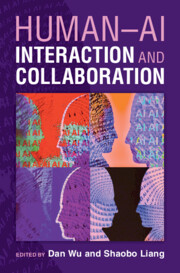Book contents
- Human–AI Interaction and Collaboration
- Reviews
- Human–AI Interaction and Collaboration
- Copyright page
- Contents
- Contributors
- Preface
- 1 Introduction
- 2 User Interaction for Human–AI Interaction and Collaboration
- 3 Privacy Identification of Human–Generative AI Interaction
- 4 Credibility Assessment of Human–Generative AI Interaction
- 5 AI-supported Crowdsourcing for Knowledge Sharing
- 6 AI-supported Search Interaction for Enhancing Users’ Understanding
- 7 AI for Human and Misinformation Interactions
- 8 Effective Human–AI Collaborative Intelligence
- 9 Human–AI Collaboration for Identifying Health Information Wants
- Chapter 10 Human–AI Collaboration for Scientific Discovery
- 11 Challenges of Generative AI on Human–AI Interaction and Collaboration
- 12 Conclusion
- References
5 - AI-supported Crowdsourcing for Knowledge Sharing
Published online by Cambridge University Press: 19 September 2025
- Human–AI Interaction and Collaboration
- Reviews
- Human–AI Interaction and Collaboration
- Copyright page
- Contents
- Contributors
- Preface
- 1 Introduction
- 2 User Interaction for Human–AI Interaction and Collaboration
- 3 Privacy Identification of Human–Generative AI Interaction
- 4 Credibility Assessment of Human–Generative AI Interaction
- 5 AI-supported Crowdsourcing for Knowledge Sharing
- 6 AI-supported Search Interaction for Enhancing Users’ Understanding
- 7 AI for Human and Misinformation Interactions
- 8 Effective Human–AI Collaborative Intelligence
- 9 Human–AI Collaboration for Identifying Health Information Wants
- Chapter 10 Human–AI Collaboration for Scientific Discovery
- 11 Challenges of Generative AI on Human–AI Interaction and Collaboration
- 12 Conclusion
- References
Summary
AI-supported crowdsourcing for knowledge sharing is a collaborative approach that leverages artificial intelligence (AI) technologies to facilitate the gathering, organizing, and sharing of information or expertise among a large group of people, known as crowd workers. Despite the growing body of research on motivations in crowdsourcing, the impact of AI-supported crowdsourcing on workers’ motives remains unclear, as does the extent to which their participation can effectively address societal challenges. A systematic review is first conducted to identify trends and gaps in AI-supported crowdsourcing. This chapter then employs a case study through a crowdsourcing platform to look for missing children to demonstrate the pivotal role of AI in crowdsourcing in managing a major societal challenge. Emerging trends and technologies shaping motivations in AI-supported crowdsourcing will be discussed. Additionally, we offer recommendations for practitioners and researchers to integrate AI into crowdsourcing projects to address societal challenges.
Keywords
Information
- Type
- Chapter
- Information
- Human-AI Interaction and Collaboration , pp. 110 - 134Publisher: Cambridge University PressPrint publication year: 2025
References
Accessibility standard: WCAG 2.2 AAA
Why this information is here
This section outlines the accessibility features of this content - including support for screen readers, full keyboard navigation and high-contrast display options. This may not be relevant for you.Accessibility Information
Content Navigation
Allows you to navigate directly to chapters, sections, or non‐text items through a linked table of contents, reducing the need for extensive scrolling.
Provides an interactive index, letting you go straight to where a term or subject appears in the text without manual searching.
Reading Order & Textual Equivalents
You will encounter all content (including footnotes, captions, etc.) in a clear, sequential flow, making it easier to follow with assistive tools like screen readers.
You get concise descriptions (for images, charts, or media clips), ensuring you do not miss crucial information when visual or audio elements are not accessible.
You get more than just short alt text: you have comprehensive text equivalents, transcripts, captions, or audio descriptions for substantial non‐text content, which is especially helpful for complex visuals or multimedia.
Visual Accessibility
You will still understand key ideas or prompts without relying solely on colour, which is especially helpful if you have colour vision deficiencies.
You benefit from high‐contrast text, which improves legibility if you have low vision or if you are reading in less‐than‐ideal lighting conditions.
